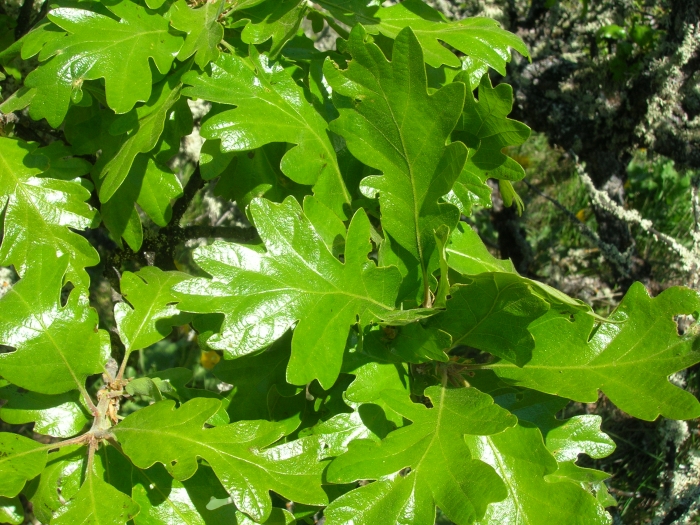Oregon White Oak
(Quercus garryana)
Oregon White Oak (Quercus garryana)
/
/

J Brew
CC BY-SA 2.0
Image By:
J Brew
Recorded By:
Copyright:
CC BY-SA 2.0
Copyright Notice:
Photo by: J Brew | License Type: CC BY-SA 2.0 | License URL: https://creativecommons.org/licenses/by-sa/2.0 | Uploader: File Upload Bot (Magnus Manske) | Publisher: Wikipedia Commons | Title: Quercus_garryana_1_(brewbooks).jpg | Notes: Quercus garryana (Garry Oak; Fagaceae), Rowena, Oregon. | ObjectName: Quercus garryana 1 (brewbooks) | UsageTerms: Creative Commons Attribution-Share Alike 2.0 |










































































Estimated Native Range
Summary
Quercus garryana, commonly known as Oregon White Oak, is a slow-growing deciduous tree native to the Pacific Northwest, including the west coast of the USA and Canada, specifically found in dry to moist open woodlands and prairies. It can reach up to 25 meters (82 feet) in height or, less commonly, grow in a shrub form to 3 to 5 meters (10 to 16+1⁄2 feet) tall. The trunk can grow to 90 centimeters (35 inches) thick, with gray, deeply fissured bark. When solitary, it has the characteristic oval profile of oaks, but it also grows in groves where the crowns may form a canopy. The leaves are a darker green on top and finely haired below, turning to a plain brown or a mixture of brown, green, and yellow in the fall. Some trees may exhibit a more striking ’peas and corn’ effect. The flowers are catkins, followed by small acorns 2–3 cm (rarely 4 cm) long and 1.5–2 cm broad with shallow, scaly cups.
Oregon White Oak is valued for its longevity, with some specimens reaching around 500 years old, and its drought tolerance, making it suitable for xeriscaping. It is often used in restoration projects, as it supports a variety of wildlife. In cultivation, it is best suited to full sun and well-drained soils, requiring low amounts of water once established. It is susceptible to heart rot in older specimens. This oak is not commonly used in small gardens due to its size but is an excellent choice for larger landscapes, parks, and naturalized areas.CC BY-SA 4.0
Oregon White Oak is valued for its longevity, with some specimens reaching around 500 years old, and its drought tolerance, making it suitable for xeriscaping. It is often used in restoration projects, as it supports a variety of wildlife. In cultivation, it is best suited to full sun and well-drained soils, requiring low amounts of water once established. It is susceptible to heart rot in older specimens. This oak is not commonly used in small gardens due to its size but is an excellent choice for larger landscapes, parks, and naturalized areas.CC BY-SA 4.0
Plant Description
- Plant Type: Tree
- Height: 70-80 feet
- Width: 35-70 feet
- Growth Rate: Slow
- Flower Color: N/A
- Flowering Season: Spring
- Leaf Retention: Deciduous
Growth Requirements
- Sun: Full Sun
- Water: Low
- Drainage: Fast, Medium
Common Uses
Bee Garden, Bird Garden, Butterfly Garden, Deer Resistant, Drought Tolerant, Edible*Disclaimer: Easyscape's listed plant edibility is for informational use. Always verify the safety and proper identification of any plant before consumption., Erosion Control, Fire Resistant, Low Maintenance, Rabbit Resistant, Street Planting
Natural Habitat
Dry to moist open woodlands and prairies
Other Names
Common Names: Garry Oak , Oregon Oak
Scientific Names: Quercus garryana , Quercus douglasii var. neaie
GBIF Accepted Name: Quercus garryana Douglas ex Hook.